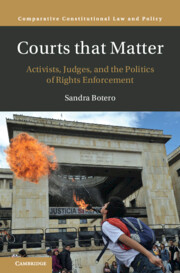Book contents
- Courts that Matter
- Comparative Constitutional Law and Policy
- Courts that Matter
- Copyright page
- Contents
- Figures
- Tables
- Acknowledgments
- 1 Introduction
- 2 Coproducing Judicial Impact
- 3 Collaborative Oversight Arenas
- 4 Assessing the Effects of Monitoring Mechanisms and Legal Constituencies
- 5 Low Impact Cases
- 6 Collaborative Monitoring in India
- 7 Conclusions
- Appendices
- References
- Index
6 - Collaborative Monitoring in India
Published online by Cambridge University Press: 02 November 2023
- Courts that Matter
- Comparative Constitutional Law and Policy
- Courts that Matter
- Copyright page
- Contents
- Figures
- Tables
- Acknowledgments
- 1 Introduction
- 2 Coproducing Judicial Impact
- 3 Collaborative Oversight Arenas
- 4 Assessing the Effects of Monitoring Mechanisms and Legal Constituencies
- 5 Low Impact Cases
- 6 Collaborative Monitoring in India
- 7 Conclusions
- Appendices
- References
- Index
Summary
Chapter 6 asks and answers the following question: Is there evidence that the presence of monitoring mechanisms and legally empowered organizations in civil society help us understand whether and to what extent other structural rulings (beyond those studied in previous chapters) can have significant impact? This chapter explores this question in a bounded manner, by conducting shadow case studies of rulings decided by the Indian Supreme Court. Here I use insights from the theoretical framework developed and illustrated in the Latin American context and apply them to the analysis of two rulings handed down by the Indian highest tribunal: the Right to Food case and the Delhi Vehicular Pollution case. Building on prior works and original research, the chapter shows that the creation of collaborative monitoring spaces in India also enhanced accountability and showed potential to shift the balance of power between a reluctant government and the litigants, allowing civil society actors, as well as others, access, and an unprecedented platform. At the same time, the cross-regional comparison highlights the dangers in lengthy time frames and excessive procedural flexibility.
Keywords
- Type
- Chapter
- Information
- Courts that MatterActivists, Judges, and the Politics of Rights Enforcement, pp. 145 - 167Publisher: Cambridge University PressPrint publication year: 2023

